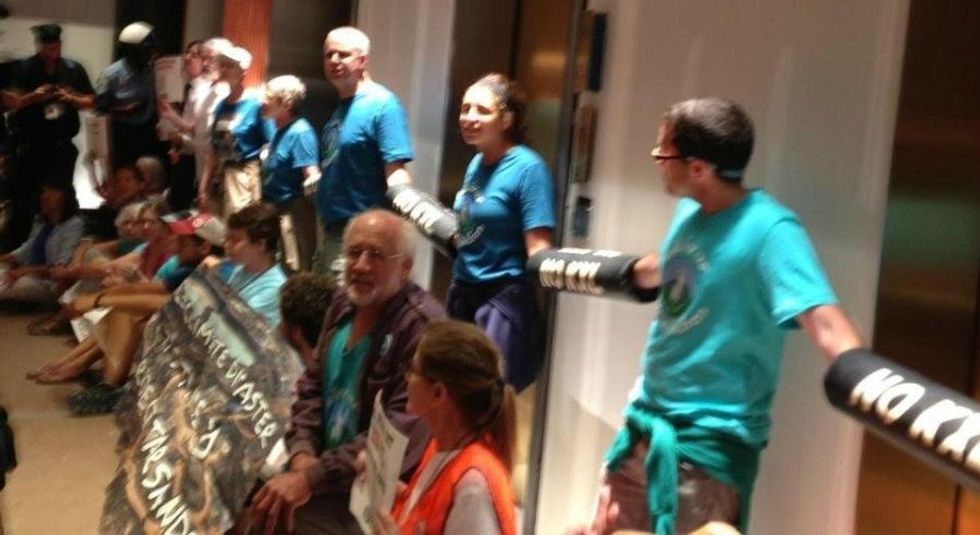

SUBSCRIBE TO OUR FREE NEWSLETTER
Daily news & progressive opinion—funded by the people, not the corporations—delivered straight to your inbox.
5
#000000
#FFFFFF
To donate by check, phone, or other method, see our More Ways to Give page.


Daily news & progressive opinion—funded by the people, not the corporations—delivered straight to your inbox.

At the beginning of this week, eleven climate activists in Michigan were arrested for blocking construction of an expansion of a tar sands pipeline that just three years ago caused the largest on-land oil spill in US history.
Of the eleven arrested, four now face felony charges and possible two-year prison sentences for chaining themselves to construction equipment at the project which is owned by Canadian pipeline company Enbridge.
Asked if this would or should deter future activists, Lisa Leggio, ones of those facing felony charges, said simply: "Hell, no. We're doing what we have to do."

On Thursday, fourteen people were arrested after bringing a halt to operations at a proposed gas fracking site in Sussex, England. The anti-fracking activists formed a human chain and refused to leave the roadway and police responded by physically separating the individuals by force.
"They just started taking people out one by one," one witness told the Guardian. "Not everyone went voluntarily and there were some struggles. A girl was shouting at one point and seemed to be quite upset and the police seemed to be quite rough. I saw a policeman with his knuckles pressing on the side of a guy's face until he released the man he was holding onto. He was obviously hurting him. Another looked like he was bending someone's little finger back."

Demanding that the State Department's final Supplemental Environmental Impact Statement (SEIS) of Keystone XL be fair, balanced, and free from the influence of the fossil fuel industry, the activists surrounded the offices, locked arms, and refused to leave until they were arrested by local police.
So what is all this?
Even if not all formally labelled as such, the actions this week paint a picture of a mid-summer campaign organized by the climate group 350.org called "Summer Heat." Designed as a series of direct actions against the fossil fuel industry, the campaign is the manifestation of an escalation in tactics by the global climate movement that says it is taking its efforts to combat global warming and educate the public about the dangers of climate change to the next level.
Focusing on the impacts of the fossil fuel industry on local "frontline" communities, the activists hope they can show that though the climate emergency is global in scale, every person--no matter where they live--has a role to play in challenging the energy paradigm that is threatening the world's vital ecosystems.
"We've reached a point where every local fight over dirty energy is also a fight for the planet's survival," explained 350.org co-founder Bill McKibben, who said that the SummerHeat campaign shows how frontline groups like the ones in Michigan, Washington, and Essex are "battling for people around the world."
The campaign, which has been ongoing throughout July, is culminating in a series of actions over this weekend nationwide:
Richmond Summer Heat - Bay Area
President Obama -- Keep your Promises - DC
Flotilla to keep New England tar sands free - Maine
2013 Walk for our Grandchildren - Maryland
Shut Down Brayton Point - Massachusetts
Oil and Water Don't Mix: A Rally for the Great Lakes - Michigan
Rally at the Rio! - New Mexico
Ohio vs. Frackers - Ohio
Pacific Northwest stands up to fossil fuel exports - Portland, OR
Utah Tar Sands Action Camp - Utah
Texas Keystone XL Showdown - Texas
Follow the #summerheat hashtag on Twitter:
Tweets about "#SummerHeat #350"
____________________________________________________
Dear Common Dreams reader, The U.S. is on a fast track to authoritarianism like nothing I've ever seen. Meanwhile, corporate news outlets are utterly capitulating to Trump, twisting their coverage to avoid drawing his ire while lining up to stuff cash in his pockets. That's why I believe that Common Dreams is doing the best and most consequential reporting that we've ever done. Our small but mighty team is a progressive reporting powerhouse, covering the news every day that the corporate media never will. Our mission has always been simple: To inform. To inspire. And to ignite change for the common good. Now here's the key piece that I want all our readers to understand: None of this would be possible without your financial support. That's not just some fundraising cliche. It's the absolute and literal truth. We don't accept corporate advertising and never will. We don't have a paywall because we don't think people should be blocked from critical news based on their ability to pay. Everything we do is funded by the donations of readers like you. Will you donate now to help power the nonprofit, independent reporting of Common Dreams? Thank you for being a vital member of our community. Together, we can keep independent journalism alive when it’s needed most. - Craig Brown, Co-founder |

At the beginning of this week, eleven climate activists in Michigan were arrested for blocking construction of an expansion of a tar sands pipeline that just three years ago caused the largest on-land oil spill in US history.
Of the eleven arrested, four now face felony charges and possible two-year prison sentences for chaining themselves to construction equipment at the project which is owned by Canadian pipeline company Enbridge.
Asked if this would or should deter future activists, Lisa Leggio, ones of those facing felony charges, said simply: "Hell, no. We're doing what we have to do."

On Thursday, fourteen people were arrested after bringing a halt to operations at a proposed gas fracking site in Sussex, England. The anti-fracking activists formed a human chain and refused to leave the roadway and police responded by physically separating the individuals by force.
"They just started taking people out one by one," one witness told the Guardian. "Not everyone went voluntarily and there were some struggles. A girl was shouting at one point and seemed to be quite upset and the police seemed to be quite rough. I saw a policeman with his knuckles pressing on the side of a guy's face until he released the man he was holding onto. He was obviously hurting him. Another looked like he was bending someone's little finger back."

Demanding that the State Department's final Supplemental Environmental Impact Statement (SEIS) of Keystone XL be fair, balanced, and free from the influence of the fossil fuel industry, the activists surrounded the offices, locked arms, and refused to leave until they were arrested by local police.
So what is all this?
Even if not all formally labelled as such, the actions this week paint a picture of a mid-summer campaign organized by the climate group 350.org called "Summer Heat." Designed as a series of direct actions against the fossil fuel industry, the campaign is the manifestation of an escalation in tactics by the global climate movement that says it is taking its efforts to combat global warming and educate the public about the dangers of climate change to the next level.
Focusing on the impacts of the fossil fuel industry on local "frontline" communities, the activists hope they can show that though the climate emergency is global in scale, every person--no matter where they live--has a role to play in challenging the energy paradigm that is threatening the world's vital ecosystems.
"We've reached a point where every local fight over dirty energy is also a fight for the planet's survival," explained 350.org co-founder Bill McKibben, who said that the SummerHeat campaign shows how frontline groups like the ones in Michigan, Washington, and Essex are "battling for people around the world."
The campaign, which has been ongoing throughout July, is culminating in a series of actions over this weekend nationwide:
Richmond Summer Heat - Bay Area
President Obama -- Keep your Promises - DC
Flotilla to keep New England tar sands free - Maine
2013 Walk for our Grandchildren - Maryland
Shut Down Brayton Point - Massachusetts
Oil and Water Don't Mix: A Rally for the Great Lakes - Michigan
Rally at the Rio! - New Mexico
Ohio vs. Frackers - Ohio
Pacific Northwest stands up to fossil fuel exports - Portland, OR
Utah Tar Sands Action Camp - Utah
Texas Keystone XL Showdown - Texas
Follow the #summerheat hashtag on Twitter:
Tweets about "#SummerHeat #350"
____________________________________________________

At the beginning of this week, eleven climate activists in Michigan were arrested for blocking construction of an expansion of a tar sands pipeline that just three years ago caused the largest on-land oil spill in US history.
Of the eleven arrested, four now face felony charges and possible two-year prison sentences for chaining themselves to construction equipment at the project which is owned by Canadian pipeline company Enbridge.
Asked if this would or should deter future activists, Lisa Leggio, ones of those facing felony charges, said simply: "Hell, no. We're doing what we have to do."

On Thursday, fourteen people were arrested after bringing a halt to operations at a proposed gas fracking site in Sussex, England. The anti-fracking activists formed a human chain and refused to leave the roadway and police responded by physically separating the individuals by force.
"They just started taking people out one by one," one witness told the Guardian. "Not everyone went voluntarily and there were some struggles. A girl was shouting at one point and seemed to be quite upset and the police seemed to be quite rough. I saw a policeman with his knuckles pressing on the side of a guy's face until he released the man he was holding onto. He was obviously hurting him. Another looked like he was bending someone's little finger back."

Demanding that the State Department's final Supplemental Environmental Impact Statement (SEIS) of Keystone XL be fair, balanced, and free from the influence of the fossil fuel industry, the activists surrounded the offices, locked arms, and refused to leave until they were arrested by local police.
So what is all this?
Even if not all formally labelled as such, the actions this week paint a picture of a mid-summer campaign organized by the climate group 350.org called "Summer Heat." Designed as a series of direct actions against the fossil fuel industry, the campaign is the manifestation of an escalation in tactics by the global climate movement that says it is taking its efforts to combat global warming and educate the public about the dangers of climate change to the next level.
Focusing on the impacts of the fossil fuel industry on local "frontline" communities, the activists hope they can show that though the climate emergency is global in scale, every person--no matter where they live--has a role to play in challenging the energy paradigm that is threatening the world's vital ecosystems.
"We've reached a point where every local fight over dirty energy is also a fight for the planet's survival," explained 350.org co-founder Bill McKibben, who said that the SummerHeat campaign shows how frontline groups like the ones in Michigan, Washington, and Essex are "battling for people around the world."
The campaign, which has been ongoing throughout July, is culminating in a series of actions over this weekend nationwide:
Richmond Summer Heat - Bay Area
President Obama -- Keep your Promises - DC
Flotilla to keep New England tar sands free - Maine
2013 Walk for our Grandchildren - Maryland
Shut Down Brayton Point - Massachusetts
Oil and Water Don't Mix: A Rally for the Great Lakes - Michigan
Rally at the Rio! - New Mexico
Ohio vs. Frackers - Ohio
Pacific Northwest stands up to fossil fuel exports - Portland, OR
Utah Tar Sands Action Camp - Utah
Texas Keystone XL Showdown - Texas
Follow the #summerheat hashtag on Twitter:
Tweets about "#SummerHeat #350"
____________________________________________________